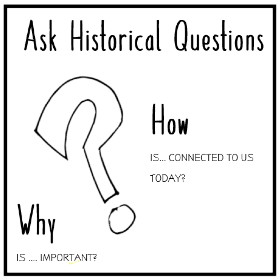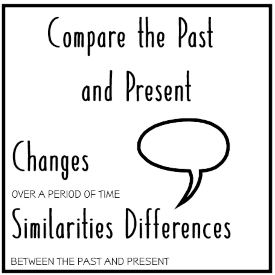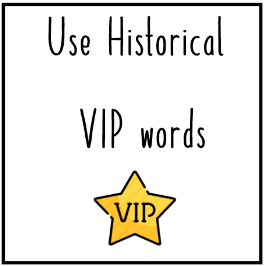History Intent
History
History at Manor Wood
At Manor Wood Primary we strive to inspire our children to think inquisitively about the world around them, always asking questions and having the opportunity to investigate the past. History is all around us, influencing not just the past but the present too. Through exploring and asking those important questions, our children will recognise how the world and community around them has changed and why. We aim to help our pupils to appreciate their own identity, as well as to think critically and communicate their thoughts and ideas confidently. By reflecting on the past, researching, debating, studying artefacts and evidence, the children will learn invaluable skills and knowledge which will help them in later life and give them the confidence they need to flourish.
The History curriculum at Manor Wood is designed to ignite a curiosity about the past amongst all pupils. It is based on key areas required in the National Curriculum 2014 and also reflects our children’s own locality and diverse demographics. Units are taught in a sequence of learning objectives that develop knowledge and historical working skills simultaneously. Curriculum planning has been developed by class teachers in accordance with our school’s ‘History Skills Progression map’. These skills are developed over their time at Manor Wood. ‘Sticky Knowledge Mats’ with finger-tip knowledge and vocabulary are provided for pupils to support their learning throughout the term and are an integral resource which ‘interrupts the forgetting’ of key knowledge and terminology. We are committed to delivering a rich curriculum which provides children with immersive and memorable experiences.
Intent
Our curriculum, at present, is organised around four key principles:
Substantive Knowledge:
Substantive knowledge is the historical content that forms our units and is guided by our National Curriculum. We ensure pupils develop a rich knowledge of the past as well as the period/individual/place they are studying including key dates.
Substantive Concepts:
Substantive concepts are concepts concerned with the subject matter of History and are best understood when they are embedded throughout the curriculum. They are ideas such as rights, peace, invasion, trade, war and monarchy which appear within all world History.
Our two key substantive concepts that we are embedding across school are:
- Religion and Monarchy
- Invasion and Conflict
- Civilisation and Empire
- Invention and Innovation
Teachers have carefully considered where it is appropriate to explicitly make reference to these concepts within their History lessons and they are outlined within our History medium term plans.
Disciplinary Knowledge:
We support children to develop knowledge of History as a discipline by exploring what History is and what historians are across school. Whilst Key Stage One develop an understanding of History as ‘a study of the past’, pupils in Key Stage Two identify History as a discipline that allows us to ‘explore and examine’ significant eras that have shaped the society we live in today. Pupils at Manor Wood understand what skills historians use to inform their findings and they develop the five key historical working skills displayed below within lessons:




Interrupting the ‘Forgetting Curve’:
At Manor Wood Primary School, we are committed to interrupting the forgetting curve and ensuring that key knowledge ‘sticks’ with them as they move throughout school.
We prioritise knowledge that is most important for our children to know and include it within each topic’s ‘sticky mat’ which is an integral part of all history lessons and is a tool for pupils to refer back to as they move through a unit. We also embed key knowledge from units which children have studied in prior year groups through the implementation of our ‘Super Six’ and ‘Fantastic Four’ half termly iterative tests.
Implementation
Our History Curriculum is personalised and progressive in nature; each year group has a curriculum organiser for each of the History topics they teach within the year, which has been created by class teachers and ensures our lessons are progressive and meet the aims of The National Curriculum. The Curriculum Organisers are available for all parents and guardians to view on our website and outline the pupils' entry point, prior knowledge and engaging hook to the unit. The medium-term plan breaks down the substantive and disciplinary knowledge taught with progression across phases evident. They also outline cross-curricular links explored in other areas. Wherever possible, our Literacy units are related to our current humanities unit as this provides our pupils with additional opportunities to develop their knowledge of a historical period.
Each History unit includes discussion around what History is and exploration into how historians construct knowledge about the past. Pupils identify the five historical working skills that underpin a wealth of activities within our curriculum. There is a review of key historical knowledge and vocabulary taught in previous sessions. Pupils are encouraged to draw upon their prior learning and refer to their ‘Sticky Knowledge Mat’ when needed. When it is clear that prior learning is fully understood, pupils build upon their substantive topic knowledge further and are provided with opportunities to investigate, discuss, and analyse historical sources, accounts, and evidence.
Assessment and Progress:
By the end of each unit, pupils are expected to understand and be able to verbalise key substantive topic knowledge outlined on the relevant ‘Sticky Knowledge Mat’ which has been used throughout lessons. Additionally, all pupils will have had multiple opportunities to develop their disciplinary knowledge throughout the unit too. Throughout the year, pupils will be challenged to remember key parts of that topic knowledge in their half-termly iterative tests known as ‘Fantastic Four’ (Year One & Year Two) and ‘Super Six’ (Year Three, Four, Five & Six).
Impact
Children at Manor Wood view themselves as historians, explorers of the past and critical thinkers. They develop progressively more refined disciplinary skills as they journey through school, and build on prior knowledge and understanding as they revisit Substantive Concepts in different time periods. They reflect on prior learning and ask questions to further their own knowledge. Teachers are supported in planning, delivering and reviewing a rich and progressive curriculum.
Further Information:
Cross-curricular Opportunities including Black History:
Pupils are given multiple opportunities to enhance their unit knowledge further within cross-curricular Literacy units which are based around a high-quality related text. The texts expand pupils’ historical bank of related vocabulary whilst providing them, during our ‘writing’ phase, to demonstrate their understanding of specific time periods whilst engaging their imagination.
We study Black History as a crucial thread throughout our History curriculum, not just for one month. However, Black History Month is a significant month in our annual calendar which deepens pupils’ empathy as they explore some of the atrocities faced by marginalised groups. Each year, at Manor Wood, we launch our History Curriculum across school, delivering lessons and workshops in Black History Month that allow pupils to ‘Remember Black Lives’ and ‘Support Black Futures’. Over the last few years, we have remembered the ‘Windrush Generation’ and supported RJC Dance, based in our city of Leeds, participating in Caribbean dance workshops and we ‘Saluted our Sisters’, exploring The Civil Rights Movement in America and Britain whilst celebrating inspirational females within those movements. Black History is high profile at Manor Wood and evidence from the past initiatives can be found on Twitter.
Get In Touch
- Carr Manor Road,
Leeds,
LS17 5DJ - 0113 268 9160
- office@manorwood.owlcotesmat.org

